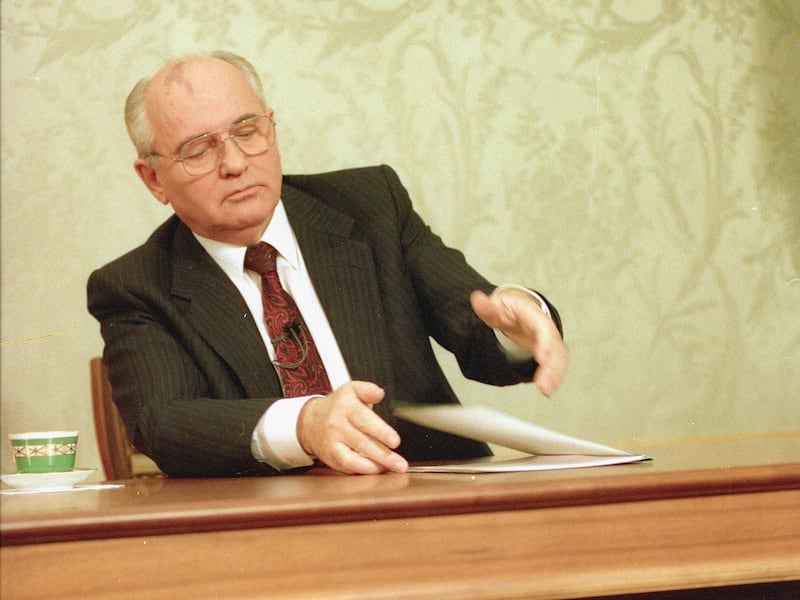The current crisis in Ukraine sounds an appeal to history that leaves us with more questions than answers. Yet, in light of the recent buildup of Russian forces on the endangered Eastern European nation’s border, the past deserves our consideration. It also raises questions about Western promises to newfound friends at the end of the Cold War.
Former Russian premier Mikhail Gorbachev was, arguably, the greatest statesman of the 20th century (I realize this is open to debate, and I give my reasons below, but encourage you to consider biographer William Taubman’s account in “Gorbachev: His Life and Times”).
He (and some would argue, with the help of his alter ego, sociologist soul mate and intellectual sparring partner Raisa, his wife) did more than usher in perestroika (reform) and glasnost (openness); more importantly, he unwittingly set in motion the dismantling of the Soviet Union and the liberalization of Russian politics and the economy through his earnest efforts to reform communism.
This he did with little bloodshed — hence my estimation of him as a transcendent statesman. While there is still some question as to the role he played during the suppression of a January 1991 putsch in Vilnius, Lithuania, as the Iron Curtain went up for the last time, his aversion to violence, which he sensed during a state visit to besieged Beijing during the 1989 Tiananmen protests, steeled his resolve against using force to salvage the shredded remains of a hollowed-out empire.
Years earlier, at the funeral of Konstantin Chernenko, Gorbachev’s predecessor, George Shultz, the Reagan-era Secretary of State rightly saw the former fresh-faced farm boy turned leader of the world’s precipitously declining Communist regime as exactly what he was — a sincere reformer. Margaret Thatcher validated such claims in the intense, though spirited political sparring, carried on in England over the relative merits of democracy and socialism. President Ronald Reagan added the avuncular bonhomie in Geneva and then frigid Reykjavik that made arms reduction a reality.
The sad fact, according to Taubman, Gorbachev’s biographer, is that apart from encouraging Gorbachev’s reforms, Western leaders did little of substance to bolster Gorbachev’s precarious position, even as Russia’s political and economic foundations disintegrated.
Yet, if there was little in material aid forthcoming from the West, Gorbachev did secure one assurance — one that now appears uncertain in the haze of historical memory: a pledge that beyond the reunified Germany, the West would not recruit former Soviet territories into the North Atlantic Treaty Organization. “Not one inch eastward,” Secretary of State James A. Baker III (along with assurances from a chorus of Western European leaders) is alleged to have stated. (see the discussion of this crucial Cold War denouement, entitled “NATO Expansion: What Gorbachev Heard,” which is part of George Washington University’s National Security Archive, https://nsarchive.gwu.edu/briefing-book/russia-programs/2017-12-12/nato-expansion-what-gorbachev-heard-western-leaders-early).
One reason for this was that Gorbachev’s conception of a post-Cold War Europe was to have been very different than the one we see today — divided along some of the same lineaments of the previous Cold War. Instead, he talked of a unified, open Europe that integrated all the former territories together with their Western neighbors into a single economic and political region — even if some elements of association between former Soviet republics remained (see https://www.theguardian.com/world/from-the-archive-blog/2019/jul/10/gorbachev-vision-for-a-common-european-home—july-1989).
Such, as the current geopolitical map of Europe confirms, was not in the cards. History often drifts away in the fog of memory as the expedience of a new day presents novel possibilities. The European Union expanded in the 1990s and early 21th century, to the benefit of Eastern Europe and the empowerment of Germany and France as working partners (a surprising result against the backdrop of the previous century). Likewise, NATO — often looking for a purpose to exist in a post-Cold War world — expanded along much the same lines.
Gorbachev has not faded from the geopolitical debate, even if he has aged and plays less of a role in Russian politics (he even attempted a run for the presidency in 1996, tallying an abysmal .5% — yes, less than 1% — of the vote). For a time, he expressed admiration for Vladimir Putin precisely because the former KGB-agent pressed Western Europe to remember the agreement they had made — “not one inch eastward” — in the aftermath of the Cold War and German reunification.
Gorbachev wisely walked back his support for the pugilistic Putin, given the younger leader’s embrace of authoritarianism, intimidation and democratic suppression.
But here we are, three decades after Western powers pledged “not one inch eastward.” Tanks are amassed along the Ukrainian and Belarussian borders. There is no easy political solution.
By no means should the United States capitulate to Putin. Furthermore, circumstances can clearly change over time. But this scenario raises the question as to what degree previous commitments play into contemporary diplomacy. Should those promises be honored or taken into consideration while formulating the calculus of brinksmanship? How might they influence diplomatic versus military considerations? History and the present make for complicated decisions.
Evan Ward is associate professor of history at Brigham Young University, where he teaches courses on world history. His views are his own.

